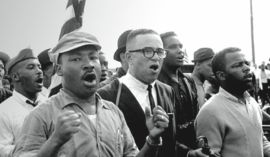Observing Human Rights Day
Introduction
Since 1950, Human Rights Day has been celebrated globally on December 10 of each year. The occasion commemorates the anniversary of the adoption of the Universal Declaration of Human Rights (UDHR) by the United Nations General Assembly on 10 December 1948. As an annual clarion call, Human Rights Day serves to remind all global citizens of the ongoing work and vigilance that is needed to ensure the realization of human rights codified in the UDHR. Notwithstanding that the UDHR is more than half a century old, the world still has not been liberated from ongoing human rights abuses and violations.
The Civil Rights Movement in the United States created a powerful generation of civil rights and human rights leaders. These leaders generated additional sociopolitical movements for global peace (e.g., ending the war in Vietnam) and universal social justice (e.g., anti-apartheid). The following lesson aims to familiarize students with the human rights principles codified in each article of the UDHR. The lesson aspires to help students realize that the UDHR is a “living” document — rather than an archival document. To this end, students will participate in an activity that focuses upon the concerted actions that Americans took to end apartheid in South Africa. They will then engage in a final activity, focusing upon Human Rights Day, to facilitate their identification of current human rights issues that need attention and rectification.
10.1, 10.9, 10.10, 11.8, 11.9, 11.10, 12.3, 12.4
Essential Question
- 1
What responsibility do we hold for violations of human rights in other countries? When we fail to take action, do we make human rights violations possible? Are we somehow responsible for these violations by our inaction?
Sub Questions
- 1
What was apartheid in South Africa? Which human rights were violated according to the Universal Declaration of Human Rights?
- 2
Why were civil rights leaders in the United States concerned with the human rights violations of apartheid in South Africa?
- 3
What actions did citizens of the United States take to end apartheid?
- 4
What are examples of current international human rights violations for which United States organizations and citizens are protesting? Do they use similar methods of protest as the American Committee on Africa used in the 1950’s and 1960’s? What new methods are being used today?
- 5
Is your community commemorating Human Rights Day, 10 December? If not, what type of celebration or commemoration would you suggest and why?


